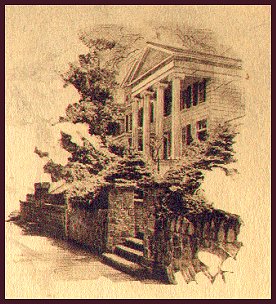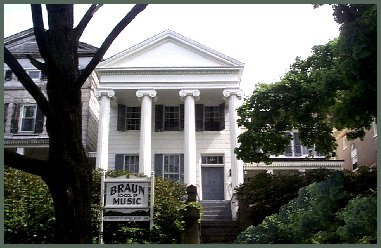 Mea
culpa, mea culpa. At left you see a detail of my mother's second diploma
from the Braun School. It shows the building at 607 Mahantongo Street,
which the school began occupying in March of 1934, just before its 25th
anniversary.
Mea
culpa, mea culpa. At left you see a detail of my mother's second diploma
from the Braun School. It shows the building at 607 Mahantongo Street,
which the school began occupying in March of 1934, just before its 25th
anniversary.
This is where her body wasWhen my mother graduated from high school in 1927, she was only three months past her 16th birthday. (By contrast, my daughter will turn 18 just after her senior year starts.) My mother had been "skipped ahead," sent from third grade to fifth grade, and at the end of fifth grade, directly to seventh grade. In those days, particularly in the isolated coal town where my mother grew up, there were no enrichment programs nor special classes for gifted students. Youngsters who showed early mastery of the "Three R's" or who seemed bored with the pace of their age-mates were simply put in the next grade.
when it was sealed, her torso clear and whole,
she walked on these lawns . . . here she had
no children, no husband, . . . Half of me
was deep in her body, dyed egg
with my name on it, in cursive script --
maybe the most serene time of my life, as I
glided above the gravel paths
there near the center of her universe . . .
-- Sharon Olds
"Visiting My Mother's College"
Rose was the youngest of three children, and by all accounts her father's favorite. He was a mail carrier, whom she has described as very kind and gentle, a man who loved his family deeply. Chances are he was very protective of his daughters, particularly Rose, who was born when he was nearly 50.
In the fall of 1927, when she entered Philadelphia's Temple University, Rose suffered paralyzing homesickness. She lived in a rooming house with her sister, then a senior, and several other girls. Much younger than the others and awkward socially, she was unable to eat and had difficulty finding her way around a campus that was larger than the town she'd come from. Whenever she saw a mail carrier, she sat down on the curb and cried.
She was home in less than a month. She went to work as a secretary/bookkeeper in a Mahanoy City shirt factory. She continued to take violin lessons (which she'd begun in 1923), traveling by bus to Pottsville, a city of 30,000 about fifteen miles from Mahanoy City. She would not go out on her own for another eight years.
I have always known the story of my mother's education -- her brief, unhappy stint at Temple, her return home, her courses at the Braun School of Music in Pottsville. Although she was deeply intelligent and well read, she did not possess a college degree, a lack which she felt all of her life. Knowing that, and carrying the misperception I had about Pottsville, I assumed that the Braun School was perhaps some genteel spinster's collection of private students -- Miss Adelaide's School of Musical Arts, if you will, where young women could learn to play the piano well enough to lead Sunday School children in "Jesus Loves Me."
 Mea
culpa, mea culpa. At left you see a detail of my mother's second diploma
from the Braun School. It shows the building at 607 Mahantongo Street,
which the school began occupying in March of 1934, just before its 25th
anniversary.
Mea
culpa, mea culpa. At left you see a detail of my mother's second diploma
from the Braun School. It shows the building at 607 Mahantongo Street,
which the school began occupying in March of 1934, just before its 25th
anniversary.
Robert Braun, who was born in the 1880's, was the son of a Pottsville physician and his wife. Robert's mother died when he was a toddler, and he was raised by his uncle and aunt, Mr. and Mrs. Frederic Gerhard. They were well known musicians and patrons of the arts who encouraged Robert's interest in music. After obtaining his initial training, he served on the faculty of the Sternberg School of Music in Philadelphia, and was organist and choirmaster of the Trinity Episcopal Church of Pottsville. In 1908 he left to study in Europe, earning degrees from the Royal Conservatory of Music in Leipzig, Germany.
Upon his return from Europe, Dr. Braun established a School of Pianoforte Playing at his father's home in Pottsville. Later he moved to ten rooms on the second and third floors of the Whitney Estate on Centre Street and renamed his enterprise the Braun School of Music.
A history of the Braun School prepared for the 130th anniversary of Pottsville's founding dispelled finally the mistaken notion I had of Robert Braun's endeavor. There were weekly recitals, and all students were required to perform their numbers from memory. A seventy piece orchestra gave one concert a month, offering the standard symphonic repertoire -- Beethoven's Fifth, Dvorak's New World, Schubert's Unfinished, Mendelssohn's Italian. Sometimes there were guest conductors from among Robert Braun's many associates and mentors. One of those guests was Leopold Stokowski.
During my mother's time at Braun, the school staged two performances of The Messiah. In 1932, 500 voices from the Pottsville Chorus, the Cass Township Mixed Chorus, and the Mendelssohn Chorus of Sunbury joined with the Braun Symphony of Seventy. The next year, Dr. Braun chose 36 exceptional voices to present the work as Handel had intended it.
My mother's name appears in notations of the school's activity for 1932 through 1934. Miss Rose Dwyer, in addition to being a member of the Symphony of Seventy, appeared as soloist in May 17, 1933, playing Sarasate's "Gypsy Airs." This is quite possibly the piece she used earlier that month to win the Rubinoff Award for Violin Supremacy, for which she received a handsome silver-plated trophy which I display on my piano. In 1934 she appeared as soloist with the Symphony of Seventy several times, including a concert given June 13 at Haddon Hall in Atlantic City, an event which was broadcast on the radio.
In December of 1935 my mother left the coal regions for a government clerical job in Harrisburg, the state capital some 65 miles to the south. She occasionally attended concerts given by the fledgling Harrisburg Symphony Orchestra. In 1942 some friends persuaded her to audition for the group herself. She won a place in the back of the second violins, where she found herself sharing a stand with another rookie, a young soldier stationed at a local Army training facility.
Sgt. Ludwig Yakimoff was a graduate of the University of Pennsylvania as well as the Curtis Institute of Music in Philadelphia. He played that season, and then shipped out. When the war was over he returned to Penn for his master's degree, hitchhiking to Harrisburg on weekends to play with the orchestra. Ludwig and Rose were married in June of 1946. I was born in March of '47.
 At
right you see the Braun School of Music in Pottsville as it appears today.
It has acquired historic site status from the Pennsylvania Museum Commission,
joining its neighbor across the street, the boyhood home of novelist John
O'Hara. I was astonished to learn that it is still in operation.
At
right you see the Braun School of Music in Pottsville as it appears today.
It has acquired historic site status from the Pennsylvania Museum Commission,
joining its neighbor across the street, the boyhood home of novelist John
O'Hara. I was astonished to learn that it is still in operation.
What I've learned about the Braun School in its heyday gives me new respect for my mother's education, a feeling I wish I'd had when she was alive. I think now that the Braun School was a place of high standards dedicated to nurturing fine musicians and promoting live performances of classical works. Had it been located in a larger city, it might have become Curtis, or Peabody, or Julliard.
And the next time I go to Pottsville, and walk down Mahantongo Street, I'll be reading Sharon Olds' poem.